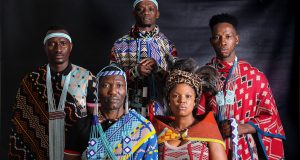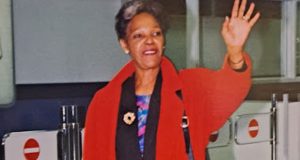By Neil Armstrong
Pride Contributing Writer
TORONTO, Ontario – Dr. Carolyn Cooper, a professor of literary and cultural studies at the University of the West Indies, has plans to celebrate the 70th birthday of reggae icon, Bob Marley, with a conference.
Having produced a book about reggae, which had its genesis in a 2008 conference she organized, Cooper is shifting her efforts to convene a conference on the creative industries and economic development in the Caribbean and beyond to mark Marley’s birthday in 2015.
She credits Chris Blackwell and his vision of packaging Bob Marley as an album as opposed to a single tune and as a sex symbol, which she said Peter Tosh and Bunny Wailer would not allow themselves to become.
“The musical element is important but the value added, marketing as intellectual capital is something that we have not really taken so seriously in Jamaica,” said Cooper.
In 1992, she conceived an idea for a Reggae Studies Centre at the University of the West Indies, Mona Campus, and in 1994 it became a reality.
Now, Cooper, who has been teaching at the UWI for 33 years and for five years before that in the USA, wants to establish a centre on Jamaica’s creative industries.
Speaking at the Toronto launch on July 25 of Global Reggae, a book she edited, Cooper started with a poem by Louise Bennett in which the character, Miss Matty, says she “hope dem caution worl’-map fe stop draw Jamaica small for de lickle speck can’t show we independantniss at all!”
She said what Bennett was doing there was satirizing the way in which the Jamaican elite was making a big deal about constitutional independence. Bennett was asserting that so-called ordinary Jamaicans had long recognized their own independence.
“In a way, what Miss Lou’s work has done so powerfully is to show that a lot of the elite discourses that we associate with nationality, the construction of identity and so on, that is up here [gesticulating with her hands a certain level], it is not on the ground and people on the ground have a different way of viewing themselves and claiming space for themselves,” Cooper said.
Cooper said the UWI was built on a sugarcane slave plantation and the legacy of slavery remains.
She said there were the slaves who colluded with the plantation and carried stories and then there were the Maroons, like her, who “carry on bad.”
“My great grandmother was an Accompong Maroon so when people say how Carolyn so terrible, I say that is the tradition that I’m coming out of. On top of that I was raised as a Seventh-Day Adventist and although, to some degree, you might think of Adventism as a very conservative fundamentalist religion, one of the things that has stuck with me about Adventism is that everybody going to church on Sunday, you going to church on Saturday. They are on the broad road to destruction, we’re on the narrow path leading to heaven,” she said.
The well-known professor and author of three books said, in a way, Adventism prepared her to have an ideological position of dissent. “It was not a consensual religion.”
Cooper said as a child growing up in the church, she was a rebel, and she suggests that her whole intellectual trajectory has been shaped by these forces: marronage (running away from the plantation) but also a religious upbringing that said “ask question, don’t just go by the rules.”
The book came out of the Reggae Studies Centre, which, surprisingly, people thought was a good idea, but “when they suddenly realized that the content of this thing was potentially revolutionary, you had problems,” she noted.
One such problem was her invitation to dancehall artiste, Vybz Kartel, to speak at the university.
Cooper said she does not know when the UWI administration will forgive her. The event was scheduled for 6:30p.m. and by 4:30p.m. the students had “taken over [the Undercroft], an administrative space,” in a way, usurping the authority of the administration.
“When you have reggae studies that try to engage with marginalized artists, you create a problem for the plantation,” she said.
She got Kartel’s presentation to be published in the Jamaica Journal and there were Jamaicans who said they would never buy the publication again.
“I’m happy that two decades after the idea of reggae studies came to me, the book is out,” she said, noting that this was at the time when Buju Banton’s “Boom Bye Bye” song came out.
Cooper said what has dogged the Jamaican popular culture, particularly dancehall, is the homophobia of the dancehall lyrics but it comes from the Old Testament.
“It comes from Leviticus, but of course, Jamaicans conveniently distinguish between the Levitical law that say homosexuals should be stoned and the laws that say adulterers should be stoned because if you were to stone adulterers, you wouldn’t have anybody left.”
She said because of the way the global music industry amplifies the noise of dancehall, “dancehall now becomes stigmatized and Jamaica is the most homophobic place on earth. No matter what we do, good or bad.”
At the time that Buju Banton got in trouble for the song, Babsy Grange was instrumental in setting up a conference to look at the potential for getting venture capital for reggae.
A conference was organized at the Jamaica Conference Centre where Cooper spoke on the ideological implications of marketing reggae internationally.
“How can we market the culture, market authenticity, in a context where some of what we are considered to be authentic Jamaican culture can’t go nowhere?” was a core question.
Cooper argued that you could not take “this anti-homosexuality thing out there without expecting serious backlash.”
She felt as an academic who understood the cultural context out of which Banton’s song had come that she needed to try to contextualize it and she did.
She got a standing ovation but the international media made a point of it in the Village Voice by saying that she came and talked about a proverb, “two pot covers can’t shut and use it to show how this homophobia is in the society and so on.”
Cooper said they completely disregarded the core idea that she was trying to express which was that there was going to be cultural dissonance between how certain things are seen in Jamaica and outside.
She ended her presentation at the conference by saying that the deejays have to think about what they’re doing.
“I was not endorsing the song at all but then I recognized that the response, both positive and negative, to the song was so powerful that on my way from the conference centre the idea came to me that we really need to have the centre where we study reggae in a serious way. And so, that is how the idea came to me through Buju and “Boom Bye Bye” in a very paradoxical kind of way that the negativity around the reception of dancehall is the thing that prompted me to realize we needed to do something in a more sophisticated and nuanced way,” she said.
There is a chapter about the setting up of the Reggae Studies Centre in Global Reggae.
Cooper said the book documents that, “Reggae goes out and there is a phase in which imitation is the primary response of non-Jamaicans. They want to get the authentic stuff and so you get a phase of just trying to sound Jamaican. But as the music evolves in its own context, then people start adapting reggae to suit their cultural needs.”
In August, Cooper will be travelling to the Rototom Sunsplash 2013 reggae festival in Spain.
Klive Walker, who has an essay in the book about reggae in Canada, prefaced Cooper’s presentation by noting that the Global Reggae Conference in 2008 was unique, innovative and groundbreaking.
He said the book lives up to its title by its representation of countries from around the world and there is a particular level of analysis that shows the impact and influence of the music from the inside out.
“Global Reggae, is indeed a fitting recognition of the impact, influence and evolution of one of Jamaica’s distinct culture on the world stage: completely disproportionate to the small dot noted on the world map representing the island,” said Nadine Mendez, Jamaica’s consul to Toronto, who attended the book launch.
Also in attendance were Ovid, one of the founding members of the reggae group, Truth and Rights; author Olive Senior, and professors Alissa Trotz and Christian Campbell of the Caribbean Studies Program, University of Toronto.
The event was held in the Book Garden of the bookstore, A Different Booklist, in Toronto.
 Pride News Canada's Leader In African Canadian & Caribbean News, Views & Lifestyle
Pride News Canada's Leader In African Canadian & Caribbean News, Views & Lifestyle





